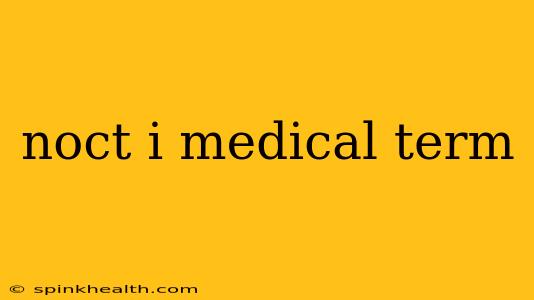The prefix "noct-" (or sometimes "nyct-") is a common medical term derived from the Latin word "nox," meaning "night." It's used to indicate conditions, processes, or symptoms that occur during the night or are associated with nighttime. This seemingly simple prefix unlocks a world of understanding in medical diagnoses and treatments. Let's delve into what "noct-" signifies and explore some common medical terms using it.
Imagine a detective investigating a mysterious case; the time of the crime is a crucial clue. Similarly, in medicine, knowing whether a symptom appears at night provides vital information. This is where "noct-" plays its crucial role. It points the medical professional toward a specific category of issues, narrowing down the potential diagnoses and influencing treatment strategies.
What Does Noct- Mean in Medical Terms?
Simply put, noct- means "night" in medical terminology. It signifies a connection to nighttime hours or events related to darkness and sleep. Understanding this basic meaning is the key to interpreting many medical terms.
Common Medical Terms Using "Noct-"
Here are some common medical terms incorporating the prefix "noct-," demonstrating its diverse applications:
-
Nocturia: This is perhaps the most frequently encountered term using "noct-." Nocturia refers to the need to wake up during the night to urinate. This symptom can stem from various conditions, including benign prostatic hyperplasia (BPH), diabetes, and heart failure. The timing—nighttime—is crucial for diagnosis.
-
Nocturnal Enuresis: Often referred to as bedwetting, nocturnal enuresis is the involuntary urination during sleep. While common in children, its persistence into adulthood warrants medical attention. Understanding the nighttime aspect helps in differentiating it from other urinary issues.
-
Nocturnal Epilepsy: This term refers to seizures that occur exclusively during sleep. This specific timing is vital for diagnosis and treatment planning, as the underlying causes and appropriate medications might differ from daytime seizures.
-
Nocturnal Asthma: Asthma attacks primarily happening at night are classified as nocturnal asthma. This points towards potential triggers unique to the nighttime environment, such as sleeping position, allergens accumulating in bedding, or changes in hormone levels during sleep.
-
Nocturnal Leg Cramps: Painful muscle spasms in the legs that occur during sleep are known as nocturnal leg cramps. While often benign, they can significantly disrupt sleep and quality of life. The nighttime occurrence highlights a possible connection to sleep-related factors.
People Also Ask: What are some less common uses of "noct-"?
While the above are common terms, "noct-" can appear in less frequent medical contexts, illustrating its wide application. It might be part of descriptive terms relating to specific conditions or observations made during nighttime examinations. The core meaning remains the same: indicating a relationship to nighttime.
People Also Ask: How does the timing of a symptom help with diagnosis?
The timing of symptoms, particularly whether they occur during the day or night, is a crucial piece of the diagnostic puzzle. For instance, knowing a patient experiences severe chest pain only at night could suggest nocturnal angina, a type of chest pain associated with reduced blood flow to the heart during sleep. Conversely, daytime chest pain might point to other cardiac issues. This emphasizes the critical role of timing in guiding medical professionals towards accurate diagnoses.
People Also Ask: What conditions commonly cause nocturia?
Nocturia can be caused by a wide range of conditions. Some of the most prevalent include:
- Benign Prostatic Hyperplasia (BPH): An enlarged prostate gland can obstruct urine flow, leading to increased nighttime urination.
- Diabetes: High blood sugar levels can increase urine production, resulting in more frequent trips to the bathroom, including during the night.
- Heart Failure: The body's inability to effectively pump blood can cause fluid retention, which may lead to increased nighttime urination.
- Urinary Tract Infections (UTIs): Infections in the urinary tract can trigger frequent urination, often at night.
- Medications: Some medications can act as diuretics, increasing urine production and potentially causing nocturia.
Understanding the underlying causes of nocturia is crucial for effective treatment.
In conclusion, the prefix "noct-" acts as a vital signpost in medical terminology, pinpointing conditions and symptoms related to nighttime. It highlights the importance of considering the temporal aspect of symptoms, offering crucial clues for accurate diagnoses and effective management of various health issues. Recognizing the significance of "noct-" deepens our understanding of medical language and its contribution to patient care.

